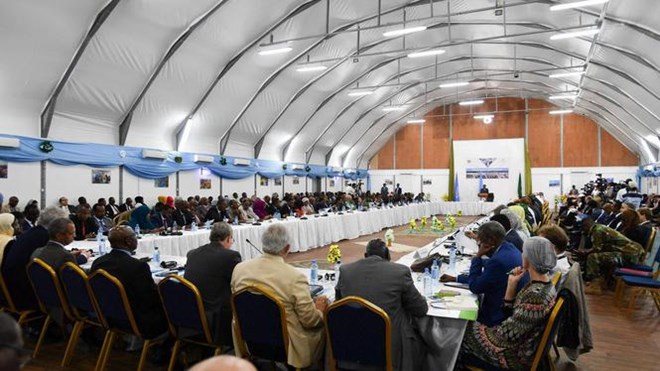Wednesday March 14, 2018

In Mogadishu there is a season for everything, we often joked to one another. Together with the rainy season, the motion season and the conference season make up Mogadishu’s three seasons. The rainy season usually starts around May, following several hot months, and consists of two miniature seasons: the big and the small rainy season. It brings back the life to the dry and dusty streets of the Somali capital and the farmers from the surrounding area greet the rain with gratitude.
Somali House of Cards
The motion season is the time when the members of the Parliament start preparing a motion of no confidence against the Prime Minister and his cabinet.
This season often begins before or after Islamic holidays and lasts three to four months. The season is marked by several tell-tale signs: the overcrowded hotels and groups of mainly men who flock to the city gates at every rumor about power change and lobby the clan leaders in an attempt to seize the coveted position of minister. Another sign of the season is the lists of parliamentarians being passed around bearing the names of those who support the motion and those who don’t. The names of who is supporting the motion and who isn’t circulate for months on social media.
advertisements
The political game will rise during this season and the government can be very generous to those who are loyal and ruthless to those who aren’t. Loyal MPs could be rewarded a position in the cabinet reshuffle that follows the motion season. Millions of dollars will be spent to win the hearts and minds of the lawmakers and make them support the government. Recent developments showcased that the use violence has become a new way of shutting down the motion and silencing the opposition. Only last month, the intelligence forces attacked a prominent opposition leader and killed his guards in what appeared to be unlawful act. The motion season is a thrilling time for political junkies, a Somali version of House of Cards. Still, it’s always painful to see the how greed and power can be lethal to a city like Mogadishu, which is constantly under the treat of terrorism, in a country where thousands of people starved to death in a tragic famine not long ago.
Conferences
Fortunately, the second season is less dramatic, though equally painful. Hotels also attract a lot of day visitors during the conference season, long queues of people holding colored folders. The conferences are often organized by order of or by the UN agencies in Somalia. The subjects are always connected to the main theme on which the European Union or the government is currently working. For example, the New Deal Compact, an overarching plan devised by the Somali government and the EU for the reconstruction of the country, was highly popular between 2013 and ’15. After the 2015 migration crisis this theme gradually changed: employment and youth are the new themes. As a result of the strong position of the UN Development Program in the city, health, gender, humanitarian aid and human development are frequently recurring subjects.
The conferences are a daily occupation for the local politicians, women’s groups and staff members of NGOs. What else can you do in a country where the government still doesn’t function fully and where leaders quickly become addicted to power? The strategy adopted by American president Donald Trump, being constantly in campaign mode, has long been a habit for a long time in Somalia, where the leaders have evolved into professional conference speakers.
Accountability
These seasons are maintained because accountability isn’t a priority, not for local leaders, nor for donors. How else can it be explained that a parliament that consists for sixty percent of diaspora Somalis – with English, Dutch, American or Canadian passports – in a country that survives for over a third on international help and has been getting away with corruption for years, hosts conferences that cost hundreds of thousands of euros and are barely evaluated.
Those two Mogadishu seasons show the vulnerability of a city, which is emerging from the ashes of a long civil war and the insecurity of a powerless international community.
The real change will be bottom up and come, from the average man and woman on the street – those who have never visited a hotel for a seminar, but always strived to rebuild the city with their own strength. They don’t need conferences; they need an incorruptible government that answers to its own people instead of to the UN and international donors.
Ayaan Abukar is a Somali-Dutch political scientist, living in Amsterdam. She is also a columnist from Vice Versa